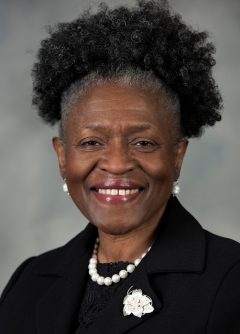Margaret Dudley of the law school’s Emergency Legal Services Program will team teach a webinar developed by the American Bar Association and Alliance for HOPE International’s Training Institute on Strangulation Prevention to help civil attorneys recognize what has been called "one of the most lethal forms of domestic violence" and better advocate for victims in court.

A national webinar series on strangulation that begins this week will be co-led by the supervising attorney for Elon Law’s Emergency Legal Services Program, which provides legal consultations to clients of the Family Justice Centers in Greensboro and Alamance counties.
Margaret Dudley is one of three presenters for the ABA program “What Civil Attorneys Need to Know About Strangulation” hosted by the American Bar Association and the Alliance for HOPE International’s Training Institute on Strangulation Prevention.
The ABA has identified strangulation as “one of the most lethal forms of domestic violence” where unconsciousness may occur within seconds and death in minutes. Described as the “ultimate form of power and control,” the webinar will help attorneys understand its lethality, identify signs and symptoms of strangulation cases, investigate and document domestic violence and sexual assault strangulation cases, and advocate for traumatized victims in court, among other learning objectives.
Register here for any or all of the four-part webinar that runs July 23 through August 27.
- Part I: Because We Didn’t Know
July 23, 2020
Understand how non-fatal strangulation is an important risk factor for homicide, the signs and symptoms of strangulation, and the federal and state laws that currently exist. - Part II: The Medical Piece
July 30, 2020
Receive an overview of the specific medical symptoms experienced by victims of strangulation, potential medical interventions for clients, and what types of funding may be available. - Part III: Building Your Case
August 6, 2020
An overview of trauma-informed interviewing, questions to include when speaking with clients about strangulation, and techniques for building an effective case. - Part IV: Advocating for Your Client
August 27, 2020
Gain an overview of risk assessment tools and other resources that are available, as well as steps civil attorneys can take moving forward to advocate for and support victims of strangulation.
Dudley will be joined by Gael Strack, CEO of Alliance for HOPE International, and Alexandria Ruden, senior attorney of the Legal Aid Society of Cleveland.
“There is a need for more education of all professionals who help victims of domestic violence regarding the serious consequences of strangulation,” Dudley said. “It is my hope that civil attorneys will be given information that will help them know the signs and symptoms of strangulation so that they can better interview clients, prepare their cases, and help ensure more offender accountability.”
The law school’s Emergency Legal Services Program within the Family Justice Centers of Guilford and Alamance counties aids victims of domestic abuse, sexual violence, and elder abuse by providing legal consultations and help with drafting complaints for restraining orders and child custody issues.
Since her appointment as the program’s inaugural director, Dudley has worked with attorneys, staff, and Elon Law students to assist more than 3,000 people across both counties.


